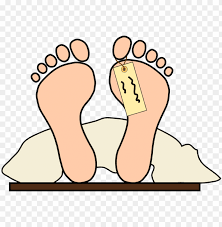John 11:1 – Now a certain man was ill, Lazarus of Bethany, the village of Mary and her sister Martha.
This chapter in the gospel of John is one of my favorites. It relates the circumstances of Lazarus and his resurrection from the dead.

It is interesting to note that this miracle is only recorded in the gospel of John. Why do you suppose the other gospel writers did not include it in their books?
The explanation lies in the fact that John wrote his gospel much later than Matthew, Mark and Luke. Lazarus (and his sisters) was probably still alive when the earlier gospels were written; the authors did not want to draw more attention to him because it put him in danger from the Jewish leaders (John 12:9-11). But by the time John penned his gospel, Lazarus was already dead so it no longer mattered.
The events of chapter 10 took place at the Feast of Dedication. According to our calendar, this would have been around mid December. The resurrection of Lazarus took place in the spring, around late March or early April, shortly before the crucifixion of Jesus. Thus, we find that there is an approximately 3-4 month gap between chapters 10 and 11.
Where was Jesus during this time? After his confrontation with the Jews in chapter 10, Jesus left Jerusalem; it was no longer safe for him to be there. He went to 'Bethany beyond the Jordan' (also called Bethabara) on the eastern side of the Jordan. This was one of the places where John the Baptist ministered (John 1:28).
There, Jesus continued to teach, minister, proclaim the gospel message and train his disciples.
About this time, Lazarus, who is a friend of Jesus, becomes extremely sick. John does not identify his illness, nor does he tell us how Jesus came to be friends with Lazarus and his two sisters. All we can say for sure is that Jesus was a close friend of this family. They also lived in a town named Bethany, but it was not the same as Bethany beyond the Jordan. Their town was only about two miles outside Jerusalem.
John 11:2 – It was Mary who anointed the Lord with ointment and wiped his feet with her hair, whose brother Lazarus was ill.
'Mary' was a common name back in the days of Jesus (at least four different women in the Bible are so named). When John says the 'Mary who anointed the Lord', he is trying to identify a particular 'Mary' among many women. While this distinction was probably clear to the people in his day, it isn't very helpful to us because there were actually two women, each named Mary, who anointed Jesus at different times.
In the first instance, Jesus was anointed by a woman named Mary, who appears to have been a woman steeped in sin. This event occurred in the city of Jerusalem in the house of a Pharisee. When she anointed Jesus she wept, washing his feet with her tears. She then wiped his feet with her hair (Luke 7:37-50). Her actions were clearly associated with an act of repentance - Jesus declares to her that her sins are forgiven.

Mary - The second instance is recorded in Matthew 26:6-13 and John 12:1-8. This event took place at the house of Simon the leper, who lived in the town of Bethany (same town as Mary, Martha and Lazarus). John very specifically identifies this woman as the sister of Lazarus, and tells us she anointed Jesus, wiping his feet with her hair. Jesus tells us that she anointed him for his upcoming burial (this anointing took place six days before his crucifixion).
Hopefully we won't confuse these two women as we read through the gospels. Mary the sister of Lazarus was the one who would anoint Jesus just before his death. There is no indication that she was the woman with a sinful character as described by Luke.
John 11:3 – So the sisters sent to him saying, "Lord, he whom you love is ill."
Did you notice that the basis for the sisters' request is NOT the good works that Lazarus did during his life, or the money he donated to the temple, or even the love he had for Jesus.
The sisters' confidence that Jesus will assist their brother stems from the love Jesus had for him!
1 John 4:10 - In this is love, not that we loved God, but that he loved us, and sent his Son to be the propitiation for our sins.
Our love is not always reliable. Sometimes it waxes or wanes depending on our circumstances. Sometimes we fail the ones we love. Sometimes we withhold our love when people disappoint us. But the love of God towards us is perfect, steadfast and unchanging, because he himself never changes (Malachi 3:6, Hebrews 13:8).
Mary and Martha are not worried about 'bothering' Jesus. They are not concerned about interrupting him when he might be busy. They don't consider themselves insignificant or unworthy to approach him. Because they are confident in the love of Jesus for them, they do not hesitate to send a message to Jesus regarding Lazarus' situation. You know what? I bet Jesus was glad they did! Wouldn't you want to know if a good friend of yours was sick or experiencing some trouble?
Now, have you ever stopped to consider that 'sending a message to Jesus' is just another way of saying 'prayer'?
Think about it – Mary and Martha love Jesus and they are confident that Jesus loves them. They have faith that he is the Son of God and that he has the power to heal. So when sickness touches Lazarus, they immediately send a message to Jesus, making their request known to him, and expecting him to act on their behalf.
Why do you pray? Isn't it because you are confident that God loves you as his child? Don't you pray because you have faith in God and his power/ability to do the things you can't do for yourself? When you encounter trouble, don't you immediately turn to Jesus in prayer, making your request known to him and expecting him to act on your behalf?
Now, let's look at what Mary and Martha DIDN'T include in their prayer. Notice that they did not tell Jesus how to resolve this situation. They didn't beg him to come immediately to Bethany and lay hands on Lazarus, or make a paste of mud/spit and rub it on him. They didn't ask Jesus to heal their brother from far away with just a word. They simply told him their concerns and they allowed Jesus to do as he saw fit.
If we are honest, I think all of us have experienced a time when we had a concern of some kind but in our prayer for that issue, we told Jesus precisely how we wanted him to take care of it. Then we were annoyed when God didn't do exactly as we asked! How ridiculous is that?
While we can and should make our requests known to God (Philippians 4:6), we should expect God to do what is best for us in every situation. Remember, you and I can't see the entire issue. We don't know how others are impacted by it. Neither do we know what the future holds. But our loving heavenly Father knows all of those things. We must trust him to do what is best for us, even if it isn't what we want at the time.
One final point I want to make here – those who earnestly love Christ are not exempt from the troubles of this life. However, we know those troubles work together for our good (Romans 8:28) and God's glory.
John 11:4 – But when Jesus heard it he said, "This illness does not lead to death. It is for the glory of God, so that the Son of God may be glorified through it."
Immediately upon hearing the message, Jesus prophesies the outcome of the situation.He specifically states two things:
The sickness of Lazarus would not result in death. Let's examine that statement for a minute. There can be no doubt that Lazarus was sick, that his illness proved fatal and that he was dead and buried for four days. He was beyond anyone's reach. He was in the eternal realm. From our perspective, he was most certainly dead!
But looking at the situation from a divine point of view, the end result of this event was NOT the death of Lazarus. Death is the means by which we leave planet earth and our attachment to our mortal, sinful bodies. Death releases us to go into the eternal world; once dead we do not return to this life again.
 So in this sense, Lazarus was not dead - he was going to return to his mortal body and live many more years here on earth (some historians say he lived another 30 years after this) before actually being summoned to his eternal abode. Jesus was fully aware that this was the case, which is why he can plainly say, 'the illness does not lead to death'.
So in this sense, Lazarus was not dead - he was going to return to his mortal body and live many more years here on earth (some historians say he lived another 30 years after this) before actually being summoned to his eternal abode. Jesus was fully aware that this was the case, which is why he can plainly say, 'the illness does not lead to death'.The scriptures contain many accounts of people who have risen from the dead (II Kings 4:29-37, Acts 20:9-12, Mark 5:35-43, etc), and the same thing could be said of them as well – their particular accident/sickness did not result in their permanent departure from this life.
As we discussed in an earlier post, death is actually a gift; without it we would be doomed to spend eternity in a life of trouble, sin, sickness and sorrow. This gift is given to every single person who was born on earth; the bible says that each one of us will undergo physical death:
Hebrews 9:27 - And as it is appointed unto men once to die, but after this the judgment:
Once we die and pass into eternity, there are only two destinations to choose from.
- You can choose to follow Christ, accept his atonement for sin and enter the kingdom of heaven. This is often referred to as eternal life.
- Alternatively, you can choose to follow Satan by rejecting the atonement of the blood of Christ and enter the kingdom of darkness. This is referred to as eternal death or the second death.
Revelation 21:8 - But the fearful, and unbelieving, and the abominable, and murderers, and fornicators, and sorcerers, and idolaters, and all liars, shall have their part in the lake which burns with fire and brimstone: which is the second death.
As a Christian, you can rejoice because at the end of this age, Jesus is going to defeat death, and raise all of his children to eternal life with him (I Corinthians 15:22-26).
If the sickness/death of Lazarus was not for the purpose of transferring him from this life to the next, exactly what was its purpose?
Jesus answers that question for us: The death of Lazarus was for the glory of God. This is similar to what we found in John 9:3, when Jesus declared that the beggar had not been born blind as the result of sin, but in order to reveal the glory of God:
John 9:3 - Jesus answered, Neither has this man sinned, nor his parents: but that the works of God should be made manifest in him.
In the same way, Lazarus became sick and died so that Christ had the opportunity to prove to all of mankind that he is the Lord of Life. By resurrecting a man who had been dead for four days (and who had started to decay), Jesus offers certain proof that he is more powerful than death.
 Think of it this way: Have you ever heard the old term 'snake oil salesman'? It was a term used to describe a peddler/salesman who sold valueless or fraudulent remedies to people. Typically, they would make some outlandish claim about their product just to get you to buy it, then they would leave town before you discovered you had been tricked and the product was worthless. Although this type of falsehood reached its peak in the mid 1800s, I am sure there were some of these charlatans in every generation!
Think of it this way: Have you ever heard the old term 'snake oil salesman'? It was a term used to describe a peddler/salesman who sold valueless or fraudulent remedies to people. Typically, they would make some outlandish claim about their product just to get you to buy it, then they would leave town before you discovered you had been tricked and the product was worthless. Although this type of falsehood reached its peak in the mid 1800s, I am sure there were some of these charlatans in every generation!Jesus has been telling his followers that he will resurrect whoever believes in him, and grant them eternal life (John 6:54) at the end of the age.
But what proof do people have that he is telling them the truth? How do they know he isn't just a snake oil salesman?
This is the importance of Lazarus' death and resurrection. They prove that Jesus is telling the truth – he has power over sin and even death. He is well able to resurrect those who trust in him for eternal life. In fact, this display of power will bring many Jews to faith in Christ.
Furthermore, this miracle proves that Jesus and the Father are one (John 10:38). The Jews recognized that only God could resurrect a dead person; so when Jesus does the same thing, it testifies to his divinity. It confirms his role as the Messiah.
The miracle of Lazarus is a comfort to Christians of every age, including us. When someone we love dies, the separation can be devastating! But we can take comfort knowing that it won't be very long until we are reunited forever in the kingdom of heaven, where sorrow and death will never set foot!
John 11:5-6 – Now Jesus loved Martha and her sister and Lazarus. So, when he heard that Lazarus was ill, he stayed two days longer in the place where he was.
Why does Jesus delay 48 hours before going to his friends?
First of all, it is important to note that Christ's delay in returning to Bethany was not a reflection of his love for this family; John clearly states that Jesus loved Martha, Mary and Lazarus. The delay did have a purpose – one which would be apparent after the miracle had been completed.
So it is with us. Occasionally, we too experience a delay in our prayers being answered. When this situation occurs, we must not allow the enemy to fool us into thinking that God does not care for us. Instead, we should stand in faith knowing that eventually, when the time is right, God will answer our request. Many times we can look back and understand the reason or purpose of the delay.
Secondly, if Christ had shown up before Lazarus died his recovery would surely have been attributed to some natural phenomenon instead of the power of God. If Jesus had made an appearance immediately after his death, people might believe that Lazarus was not really dead, but just in some kind of coma or trance.
 But when a man has been four days, it's a totally different story. By that time, he has begun to decay and smell bad. By that time, the family has prepped him for burial, attended the funeral service and interred the body. They have a death certificate in hand and they are waiting on a check from the life insurance company. In short, after four days there is absolutely no question that he is dead! Therefore, the delay serves to make the miracle of resurrection irrefutable; it eliminates any chance of fraud.
But when a man has been four days, it's a totally different story. By that time, he has begun to decay and smell bad. By that time, the family has prepped him for burial, attended the funeral service and interred the body. They have a death certificate in hand and they are waiting on a check from the life insurance company. In short, after four days there is absolutely no question that he is dead! Therefore, the delay serves to make the miracle of resurrection irrefutable; it eliminates any chance of fraud.
Have you ever earnestly prayed for a situation or a miracle only to find that God delayed in answering you? Did you lose hope or mistakenly think that God was ignoring you? Nothing could be further from the truth! Perhaps God is waiting because they delay will make his intervention beyond question. Perhaps he is glorifying himself through us and using our situation to draw sinners to himself.
John 11:7 – Then after this he said to the disciples, "Let us go to Judea again."
Bethany, the town of Mary/ Martha/Lazarus, was a mere two miles from Jerusalem. If Jesus went there, the religious leaders would certainly hear about his ministry and they wouldn't hesitate to try and kill him there. Going there meant putting himself (and the disciples) in harm's way. While that didn't bother Jesus in the least, it caused his disciples to be concerned. They couldn't understand why Jesus would willingly put everyone in danger from the Jews.
We too are servants of Christ who are sometimes placed in circumstances which are just as puzzling or perplexing as those of the disciples. Sometimes Jesus leads us down paths that we would never have chosen for ourselves and worse yet, we can't see the purpose behind the journey.
During those times, we must exercise both faith and patience. We must believe that God is leading us in the paths of righteousness for his names' sake. We can be confident that God is taking us down paths that will promote our spiritual good and help us keep our sins in check. And all along the way, our relationship with him is growing deeper and more satisfying.
John 11:8 – The disciples said to him, "Rabbi, the Jews were just now seeking to stone you, and you are going there again?"
The disciples had no difficulty at all remembering that the Pharisees had tried to stone Jesus the last time they were in Jerusalem (John 10:31, 39). And in reality, the danger Jesus faced was their danger too – the Jews would not hesitate to stone them right alongside their master. So part of their concern may well have been for their own safety.
However, the disciples could take comfort knowing that Jesus did not send them into danger while remaining in a place of safety himself. He not only accompanied them into the danger zone, he led them there with the intent of walking through the fire with them.
Isaiah 43:2 - When you pass through the waters, I will be with you; and through the rivers, they shall not overflow you: when you walk through the fire, you shall not be burned; neither shall the flame scorch you.
Indeed, Jesus walks with us always, even through the valley of the shadow of death (Psalms 23:4). Just ask Lazarus the next time you see him!
Let me offer you some encouragement:
In today's post we talked about delayed answers to prayer. The truth is that God never slumbers or sleeps (Psalms 121). He always hears his children when we call out to him.
But sometimes, in his infinite wisdom, he chooses to answer our prayers in his time frame, not ours! During such times, our faith should rise up and give us the ability to trust our heavenly Father, who loves us just as much as Mary, Martha and Lazarus.
Don't buy into the lie that God has forsaken you or that he does not love you. Instead, trust him all the more, for he is well able to do abundantly above all that we could ask or think!
As Matthew Henry so eloquently puts it, "In the depths of affliction, let this therefore keep us out of the depths of despair; man's extremity is God's opportunity."
Let me offer you some relief:
Many people are afraid of death. They don't want to acknowledge it, discuss it, or even think about it. But there is no reason for the Christian to fear death because we are prepared for it. For us, death it is simply the vehicle that takes us from this world into our eternity with God.
The next time you find someone who is afraid of death, try giving them the peace and hope of the gospel message.
Let me offer you some strength:
Are you ever puzzled or frustrated by the path your life seems to take? Perhaps circumstances beyond your control have taken you on an unexpected detour in life. If so, stand strong, because God is going to do something amazing in your life through that detour!
 If the disciples had not been led back into Bethany, they would have missed the glorious miracle of Lazarus' resurrection. If we were to choose our own paths, it's a sure bet we would take the easy road and miss out on discovering numerous facets of Christ and his grace. I am convinced that when our race is over, we will be glad Christ took us along those detours!
If the disciples had not been led back into Bethany, they would have missed the glorious miracle of Lazarus' resurrection. If we were to choose our own paths, it's a sure bet we would take the easy road and miss out on discovering numerous facets of Christ and his grace. I am convinced that when our race is over, we will be glad Christ took us along those detours!So when life 'gives you lemons', don't give up or despair. Instead, ask the Lord to let you experience his abundant grace!
